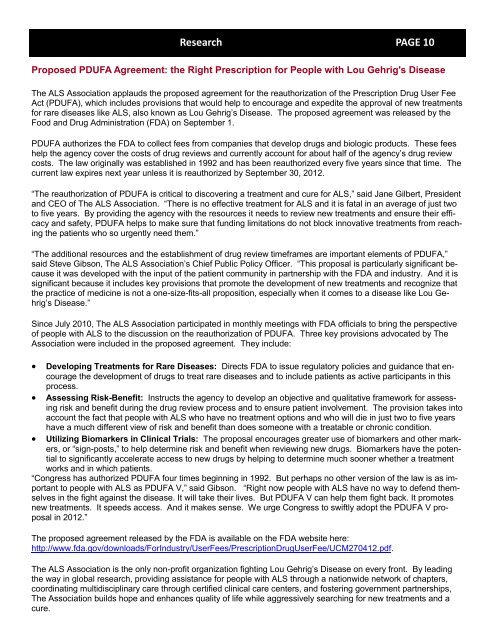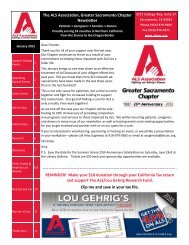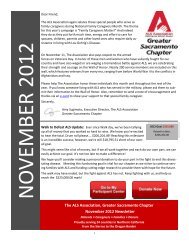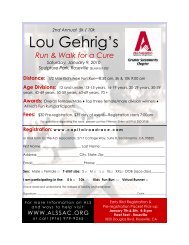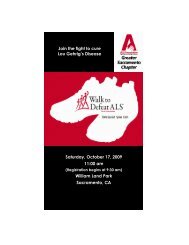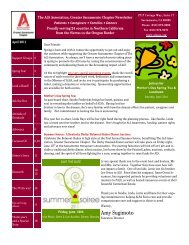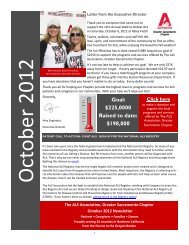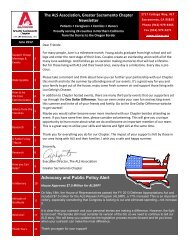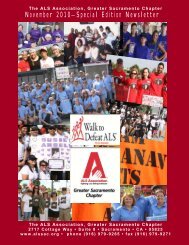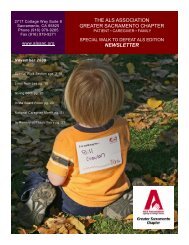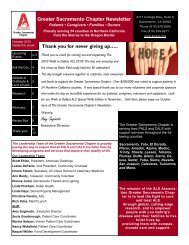Thank you to Larrie & Diane Grenz! - The ALS Association Greater ...
Thank you to Larrie & Diane Grenz! - The ALS Association Greater ...
Thank you to Larrie & Diane Grenz! - The ALS Association Greater ...
You also want an ePaper? Increase the reach of your titles
YUMPU automatically turns print PDFs into web optimized ePapers that Google loves.
Research<br />
PAGE 10<br />
Proposed PDUFA Agreement: the Right Prescription for People with Lou Gehrig's Disease<br />
<strong>The</strong> <strong>ALS</strong> <strong>Association</strong> applauds the proposed agreement for the reauthorization of the Prescription Drug User Fee<br />
Act (PDUFA), which includes provisions that would help <strong>to</strong> encourage and expedite the approval of new treatments<br />
for rare diseases like <strong>ALS</strong>, also known as Lou Gehrig’s Disease. <strong>The</strong> proposed agreement was released by the<br />
Food and Drug Administration (FDA) on September 1.<br />
PDUFA authorizes the FDA <strong>to</strong> collect fees from companies that develop drugs and biologic products. <strong>The</strong>se fees<br />
help the agency cover the costs of drug reviews and currently account for about half of the agency’s drug review<br />
costs. <strong>The</strong> law originally was established in 1992 and has been reauthorized every five years since that time. <strong>The</strong><br />
current law expires next year unless it is reauthorized by September 30, 2012.<br />
“<strong>The</strong> reauthorization of PDUFA is critical <strong>to</strong> discovering a treatment and cure for <strong>ALS</strong>,” said Jane Gilbert, President<br />
and CEO of <strong>The</strong> <strong>ALS</strong> <strong>Association</strong>. “<strong>The</strong>re is no effective treatment for <strong>ALS</strong> and it is fatal in an average of just two<br />
<strong>to</strong> five years. By providing the agency with the resources it needs <strong>to</strong> review new treatments and ensure their efficacy<br />
and safety, PDUFA helps <strong>to</strong> make sure that funding limitations do not block innovative treatments from reaching<br />
the patients who so urgently need them.”<br />
“<strong>The</strong> additional resources and the establishment of drug review timeframes are important elements of PDUFA,”<br />
said Steve Gibson, <strong>The</strong> <strong>ALS</strong> <strong>Association</strong>’s Chief Public Policy Officer. “This proposal is particularly significant because<br />
it was developed with the input of the patient community in partnership with the FDA and industry. And it is<br />
significant because it includes key provisions that promote the development of new treatments and recognize that<br />
the practice of medicine is not a one-size-fits-all proposition, especially when it comes <strong>to</strong> a disease like Lou Gehrig’s<br />
Disease.”<br />
Since July 2010, <strong>The</strong> <strong>ALS</strong> <strong>Association</strong> participated in monthly meetings with FDA officials <strong>to</strong> bring the perspective<br />
of people with <strong>ALS</strong> <strong>to</strong> the discussion on the reauthorization of PDUFA. Three key provisions advocated by <strong>The</strong><br />
<strong>Association</strong> were included in the proposed agreement. <strong>The</strong>y include:<br />
Developing Treatments for Rare Diseases: Directs FDA <strong>to</strong> issue regula<strong>to</strong>ry policies and guidance that encourage<br />
the development of drugs <strong>to</strong> treat rare diseases and <strong>to</strong> include patients as active participants in this<br />
process.<br />
Assessing Risk-Benefit: Instructs the agency <strong>to</strong> develop an objective and qualitative framework for assessing<br />
risk and benefit during the drug review process and <strong>to</strong> ensure patient involvement. <strong>The</strong> provision takes in<strong>to</strong><br />
account the fact that people with <strong>ALS</strong> who have no treatment options and who will die in just two <strong>to</strong> five years<br />
have a much different view of risk and benefit than does someone with a treatable or chronic condition.<br />
Utilizing Biomarkers in Clinical Trials: <strong>The</strong> proposal encourages greater use of biomarkers and other markers,<br />
or “sign-posts,” <strong>to</strong> help determine risk and benefit when reviewing new drugs. Biomarkers have the potential<br />
<strong>to</strong> significantly accelerate access <strong>to</strong> new drugs by helping <strong>to</strong> determine much sooner whether a treatment<br />
works and in which patients.<br />
“Congress has authorized PDUFA four times beginning in 1992. But perhaps no other version of the law is as important<br />
<strong>to</strong> people with <strong>ALS</strong> as PDUFA V,” said Gibson. “Right now people with <strong>ALS</strong> have no way <strong>to</strong> defend themselves<br />
in the fight against the disease. It will take their lives. But PDUFA V can help them fight back. It promotes<br />
new treatments. It speeds access. And it makes sense. We urge Congress <strong>to</strong> swiftly adopt the PDUFA V proposal<br />
in 2012.”<br />
<strong>The</strong> proposed agreement released by the FDA is available on the FDA website here:<br />
http://www.fda.gov/downloads/ForIndustry/UserFees/PrescriptionDrugUserFee/UCM270412.pdf.<br />
<strong>The</strong> <strong>ALS</strong> <strong>Association</strong> is the only non-profit organization fighting Lou Gehrig’s Disease on every front. By leading<br />
the way in global research, providing assistance for people with <strong>ALS</strong> through a nationwide network of chapters,<br />
coordinating multidisciplinary care through certified clinical care centers, and fostering government partnerships,<br />
<strong>The</strong> <strong>Association</strong> builds hope and enhances quality of life while aggressively searching for new treatments and a<br />
cure.


